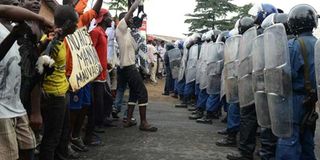Kenya supports free and fair elections in Burundi but won't interfere, says Foreign PS Karanja Kibicho

Police in Burundi face off with protesters opposed to Nkurunziza's bid for a third term. Cord leader Raila Odinga has criticised East African leaders for remaining silent as the situation in Burundi gets out of hand. AFP PHOTO | SIMON MAINA
Kenya says it stands for free and fair elections but will not interfere with the goings-on in Burundi.
Foreign Affairs PS Karanja Kibicho who toured Bujumbura on Friday said Kenya will instead focus on supporting the country’s electoral commission to help Burundians elect their leader.
“Burundi is a sovereign country and what they decide at elections is what we will support.
“The international community must support the electoral body so that elections are free, fair and transparent.” he told the Nation on Saturday.
“Of course the issue of whether Mr (Pierre) Nkurunziza should vie or not is already before the court and we will support whatever decision the (constitutional) court comes up with. We support a peaceful process.”
At least ten people have been killed and thousands have fled to neighbouring Rwanda, since the protests broke out in Burundi on Sunday, a day after the ruling party, National Centre for the Defence of Democracy – Forces for the Defence of Democracy (CNDD-FDD) nominated Mr Nkurunziza as its candidate for the June 26, 2015 election.
Security agencies followed the protests with a crackdown on protesters, arresting about 600, most of them university students and human rights activists, and shutting down an influential radio station and a public university in the capital Bujumbura.
On Thursday, Nkurunziza reportedly warned protesting youth from “being manipulated… because, just to remind you, the country’s laws do not allow protests during the electoral period.”
Dr Kibicho was responding to an inquiry on whether Kenya would urge President Nkurunziza to retire for the sake of peace.
EAC QUIET ON BURUNDI
The East African Community to which Burundi belongs has been largely quiet on the chaos although Kenya on Friday announced it was donating 150 laptops and $6,000 (Sh564,000) to Burundians to organise the elections.
President Nkurunziza, a former rebel, has been Burundian President since 2005 when he was voted in to replace a transitional government that had been in place since 2000 when parties signed the Arusha Accord, to end years of civil war.
He was re-elected in in 2010.
Opposition supporters as well as political and civil society activists say a third term would violate the country’s constitution and the terms of the Arusha Accord which ended a civil war by creating a power sharing structure.
But Nkurunziza’s supporters argue his first term, between 2005 and 2010, does not count because he was elected by legislators and not directly by the people.
Burundi has known full peace only since 2008 when the government signed a ceasefire agreement with the last active rebel group the Party for the Liberation of the Hutu People – National Liberation Forces (Palipehutu-FNL).
The chaos were solved through what the AU calls an ‘African solution’ and the country has been the only known case where African countries concerted to successfully bring peace after years of civil war.
On Friday, the African Union sent a team of envoys to Burundi to help “defuse current tension” but said little on whether they will urge Mr Nkurunziza to retire.
The violence has been condemned by the United Nations Secretary-General Ban Ki-moon, who said he was sending his Special Envoy for the Great Lakes Region, Said Djinnit, to Bujumbura to meet President Nkurunziza and other government officials in an attempt to defuse the crisis.
US government officials have publicly asked President Nkurunziza not to seek re-election and the British government said it “deeply regrets” Nkurunziza’s nomination.
Burundi at a glance
•Colonised by the Belgians, French is the most spoken language although Burundians have been slowly adopting English to be fully part of the EAC.
•Has a Gross Domestic Product per capita of just $268, making it the poorest country in the EAC.
•Has only known full peace since 1998 after Nkurunziza’s government signed a ceasefire agreement with last rebel groups, Palipehutu-FNL.
•Has had several coups and coup attempts, the last coup was in 1996 by Pierre Buyoya, the same man who had engineered a similar coup in 1988.
• In 1993, Burundi passed a new democratic constitution and Melchior Ndadaye became the first elected president.
•Burundi has had two presidents killed; Mr Ndadaye was assassinated in 1993 while Cyprien Ntaryamira who replaced him was killed after a plane which was also carrying Rwandan President Juvénal Habyarimana was shot down over Kigali in 1994.
•The shooting of the plane led to civil war which claimed about 250,000 Burundian lives.
•In 1997, regional countries imposed economic sanctions for the first time on Burundi, forcing rebels to negotiate for peace in Arusha, Tanzania.
•17 parties signed the Arusha Accord in 2000 and in 2001, Buyoya became the transitional president.
•In 2005, Nkurunziza was endorsed by legislators to be president for five years in a power-sharing deal that was meant to absorb all the ethnic communities in the country.




